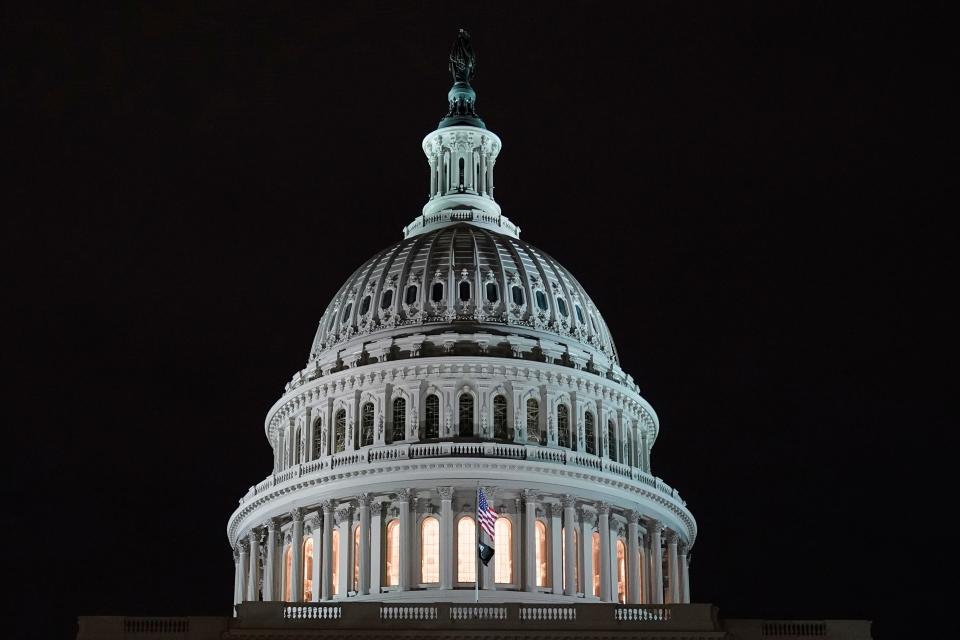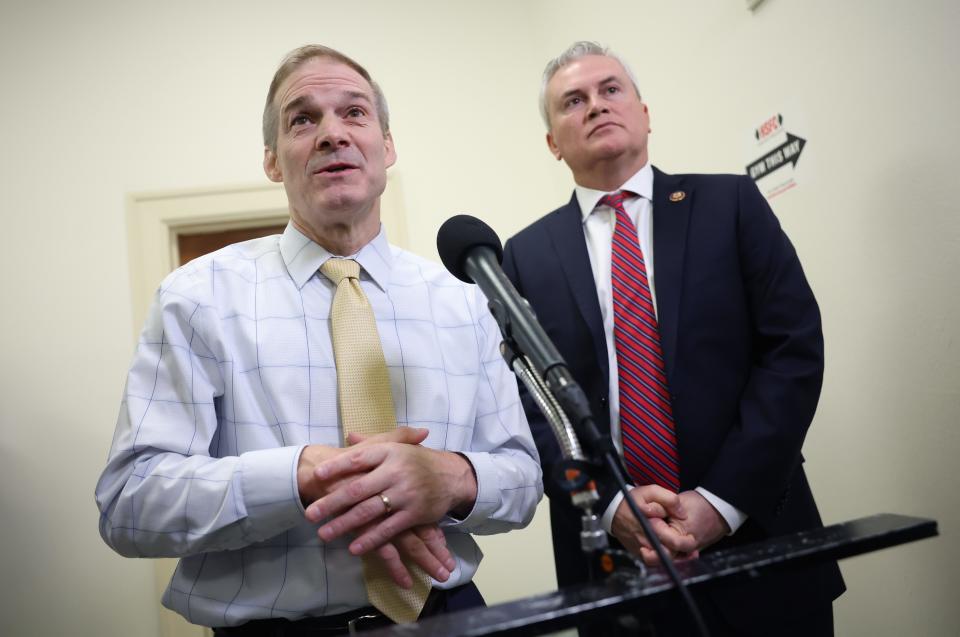Government shutdown, border, foreign aid: What to watch from Congress as it returns from recess
- Oops!Something went wrong.Please try again later.
WASHINGTON – Lawmakers are back in Washington after the holiday break and heading into a chaotic month. Though they have a short to-do list, it includes daunting tasks for what has been a historically unproductive Congress.
Congress has less than two weeks to avert a partial government shutdown after kicking the can down the road twice. While lawmakers avoided the traditional Christmas deadline crunch, they now are up against the clock.
Lawmakers reached a spending agreement Sunday, but the country isn't out of the woods yet. The full House and Senate still have to pass the agreement and send it to President Joe Biden’s desk before a government shutdown sets in.
Along with funding the government, lawmakers continue to negotiate an all-encompassing foreign aid package that provides assistance to key U.S. allies such as Ukraine and Israel.
Despite the apparent urgency that befell Capitol Hill to swiftly pass foreign aid last fall, that decisiveness has largely fallen to the wayside as negotiators seek to tie border policy changes – a notorious policy area on which Congress has failed to agree – to foreign aid.
Against the backdrop of those two, time-sensitive issues, House Republicans are continuing their impeachment inquiry into Biden. They accuse, without direct evidence, the president of financially benefiting from his family’s foreign business dealings.
Here’s what to know about Congress’ agenda as lawmakers return to session.

Averting a government shutdown
The most immediate task for lawmakers is averting a government shutdown. Congress passed two stopgap measures in the fall. The last continuing resolution funded the government with a two-phased approach, setting a Jan. 19 funding deadline for some government functions and a Feb. 2 deadline for the rest.
House Speaker Mike Johnson, R-La., put forth the two-step continuing resolution in part to avoid setting a Christmas funding deadline. That crunch has become the norm over the past years on Capitol Hill and has often pressured lawmakers to pass a last-minute deal before heading home for the holidays.
But Johnson's approach has now left lawmakers with less than two weeks to fund the government or face a partial shutdown.
Lawmakers announced a $1.66 trillion spending agreement this week to keep the government's doors open in 2024, including $886.3 billion in defense spending and $772.7 billion in domestic, nondefense spending. It's in line with a deal Biden and former House Speaker Kevin McCarthy, R-Calif., made last year during tense debt ceiling negotiations.
The first tranche of government funding that expires on Jan. 19 pays for agriculture; military construction and veterans affairs; transportation, housing and urban development; and energy and water. The remaining spending expires on Feb. 2.
House Republicans are hoping to make the migrant crisis at the southern border a focal point in the new year. While border policy negotiations were at first tied to a foreign aid package, talks of including border policy changes in a government funding package could hamper shutdown negotiations.
Rep. Chip Roy, R-Texas, a member of the ultra conservative House Freedom Caucus, in a letter urged his colleagues to “make funding for federal government operations contingent on the President signing H.R.2, or its functional equivalent, into law and stopping the flow across our border.” He referenced House Republicans’ partisan border bill that includes new restrictions on asylum law.

Passing foreign aid for Ukraine and Israel
While the most conservative lawmakers in the House are pushing for border changes in a government funding package, negotiators in the Senate are trying to reach a deal with to provide funding for key U.S. allies such as Ukraine and Israel.
But Senate Republicans have pushed to tie border security changes to a foreign aid package, which has stalled U.S. assistance to Ukraine and new funding for Israel.
Much of the discussions have remained private. Negotiations have been moving slowly largely because Democrats have balked at the changes Republicans have proposed to border policy, calling them too severe and restrictive. Republicans argue Democratic proposals would do little to address the crisis.
To make things more difficult, it’s unclear whether the House would take up any deal from the Senate. Johnson has heavily pushed for House Republicans’ border bill and called it last week the “necessary ingredient” to addressing the border.

GOP investigators continue Joe Biden impeachment inquiry
While Congress faces two urgent deadlines, GOP investigators are continuing their impeachment inquiry into the president.
House Republicans have long alleged Biden personally benefited from his family’s overseas business dealings. But while the inquiry has shown his family made millions from their foreign interests, the inquiry has yet to deliver evidence directly implicating the president in those ventures.
The House Oversight Committee, one of the committees leading the inquiry, announced last week that it would hold the president’s son Hunter Biden in contempt of Congress after he defied a subpoena to testify to investigators behind closed doors. The House Judiciary Committee, another committee leading the investigation, will consider a similar resolution.
Hunter Biden demanded to testify in a public hearing because he said he wanted to avoid Republicans selectively leaking parts of his transcript. Republicans refused Hunter Biden’s request, saying that Democrats would disrupt a public hearing and that he does not dictate the terms of the subpoena.
Hunter Biden “blatantly defied two lawful subpoenas, choosing to read a prepared statement outside of the Capitol instead of appearing for testimony as required,” House Oversight Chair James Comer, R-Ky., and House Judiciary Chair Jim Jordan, R-Ohio, said in a joint statement. “We will not provide him with special treatment because of his last name.”
The White House has repeatedly dismissed the inquiry, noting that investigators have failed to produce evidence tying the president to his family's business affairs.
Hunter Biden also has denied the allegations his father was involved, calling the investigation "shameless" outside the Capitol on the day he had been scheduled to testify.
"There is no evidence to support the allegations that my father was involved in my business because it did not happen," Hunter Biden said.

This article originally appeared on USA TODAY: Congress is back. Here are 3 big things to watch

